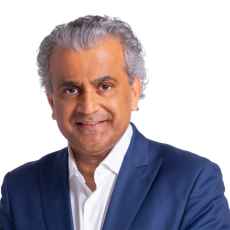Varo is at an interesting point in time; you have been appointed CEO in January and you have started the twin engine strategy - what is all of this about?
This year has demonstrated once again the need for accelerating the energy transition. The tragic war in Ukraine highlights the reality of the massive concentration of oil and gas; just four countries control 50% of the world’s oil and gas resources, while consumption is obviously spread around the globe. The world therefore needs to accelerate the energy transition, and our strategy is doing exactly that by investing in, and providing, safe, reliable and sustainable energy. We do this through a combination of conventional and sustainable energies – hence, the “two engines”. We want to be a company that is in the broader, more diversified canvass of energy, responding to changing market demand.
When one talks of sustainability, one tends to think about the new - but there is much to be done with existing infrastructure. As an example, we have taken out 300,000 tons of CO2 emissions from our manufacturing hub in the course of last year, and we are in the process of building Switzerland’s largest ground mounted solar facility to power our needs. There is a lot that can be done for energy security and sustainability, both in existing operations and in new facilities.

This transition must be a “just transition” if we get it right. It is not about shutting down every pipeline, every refinery; it is about taking gas pipelines and making them the hydrogen pipelines of the future, it is about converting hydrocarbon refineries and making them bio-refineries.
This way we give people purpose and opportunity, which is a meaningful thing to be a part of.
What are the main challenges customers face when transitioning into sustainable operations and energy?
Firstly, it is about having access to secure energy, something which is being underscored today. Secondly, achieving scale is vital. This requires the right market signals such as incentives that accelerate the creation of new production, instead of subsidies for consumption. The latter is a bad idea and builds a pattern that is never economic.
Across your business segments, is there any market that has particular potential?
All of them – and they will move at a different pace, but there is an extraordinary growth opportunity for all of our business segments. We call them our five “strategic growth accelerators”. There is a robust advanced biofuels market, which, we think, will grow significantly, and advanced biogas, which becomes incredibly important as you think about gas needs. We want to scale up by integrating the value chains even faster. We want to build up in our own backyard because we can access natural scale. 70% of the hydrogen demand in Switzerland is from us, which means that we can help establish the pace for the green hydrogen market in Switzerland, and we are looking to do the same across all segments. We also have a significant global nature-based carbon solutions business which we want to expand and have a growing business in e-mobility.
Our customers do not live in a separate world, they have their own customers, employees, investors, and they all also want to move towards a better future. I believe the business of energy is not a niche product - think about solar being material over the past decade and with it, a resultant 90% decrease in panel costs. This is the future - we need to scale, and we can only scale by building partnerships and working together.
There seems to be an inflection point coming up. Will this new trajectory be enough to meet the 2050 targets?
The world will require more energy in the next three decades. This is a story of human progress and increasing prosperity. 80% of the world has never flown. Of that 20% that have flown, 80% have only flown once. I cannot imagine a solution which equates to no flights for the people that have never flown; the solution has to be about providing the sustainable energy which gives them the ability to fly. We simply need to recognize that in the next three decades we will need more energy, and we need to provide it in a way which enables sustainability, security of supply, and affordability. VARO is responding to these needs by investing, growing our business, and trebling the size of the company in the next five years. We are repurposing existing assets, building new assets, creating integrated value chains of molecules and electrons, and advancing partnerships. Through our “Customer Lighthouses”, we want to provide our customers the energy they need, in the way that they want. We believe we can help them secure their present and build their future. There is more to be done, but with our VARO way of working – agile, nimble and entrepreneurial – we are confident for the future.





